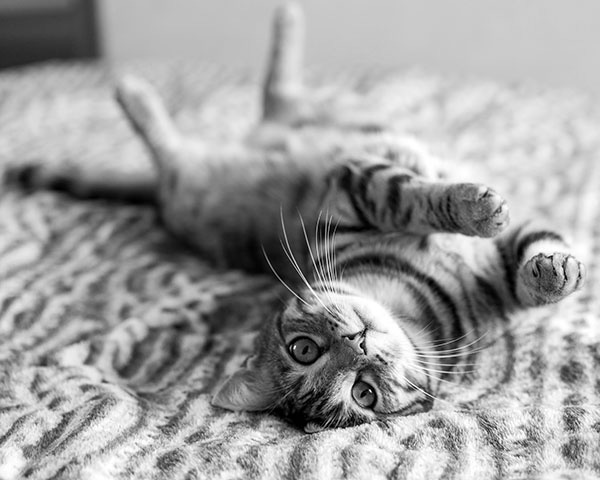What human food can cats eat?
Cats can be picky eaters, and it’s not uncommon for them to refuse perfectly good food. Instead, they might stare hungrily at your dish. Although cats should stick to a complete and balanced cat food, there are some foods you can share with your feline that won’t cause them harm.
Meat
Cats are obligate carnivores, so it’s no surprise they enjoy small amounts of cooked meats. Chicken, turkey, beef, lamb and liver are all okay for your cat to eat. You should never feed them raw meat, however, and always remove all skin and bones before feeding them.
Fish
Fish can be a tasty addition to your kitty’s diet. It contains omega-3 fatty acids that benefit your cat’s overall health. Canned or cooked fish is fine for a small treat, but only in moderation. Avoid feeding your cat raw fish, and remember to remove all bones before they chow down.
Eggs
Believe it or not, eggs are good for cats. Packed with protein and amino acids, this type of food makes for a healthy feline treat. Whip up a small portion of scrambled or boiled eggs and watch your kitty tuck in. Like humans, cats are at risk of salmonella, so avoid feeding them raw eggs.
Vegetables
Some cats might turn their nose up at veggies, but they’re a great source of fibre, vitamins and water. If your cat enjoys the odd vegetable snack, cucumber, carrots, asparagus, peas and steamed broccoli are some safe options . Stay clear of onion and garlic, as these are toxic to cats
Fruits
Yummy as they are for humans, fruits can be hit or miss for cats since they can’t taste sweet flavours. Many fruits are rich in vitamins A and C, as well as potassium and fibre. Blueberries, cantaloupe, seedless watermelon, bananas and peeled, deseeded apples can be a great snack for sweet-toothed kitties.
Whole grains
Thanks to their texture, oats, corn, and coarsely ground cornmeal are a treat for cats. They’re also packed with protein. You can include whole grains like barley, wheat berries and brown rice in their diet, but smaller grains like millet and couscous will be a favourite. Make sure to cook the grains so your kitty can digest them fully.
Can cats drink milk?
Cats are often depicted lapping up milk, so much so it isn’t often questioned whether milk is good for cats. However, despite popular belief, most cats are lactose intolerant, and milk – cow’s milk or otherwise – is actually detrimental to their health.
If cats consume milk and other dairy products, they can experience vomiting or diarrhoea. That doesn’t stop cats from trying to drink it, though! Cats like the taste and will often choose to drink milk, even if it upsets their stomach.
Kittens are born with the ability to process lactose. When they’re around four weeks old, they begin to wean off their mum’s milk. As they grow and eat more solid foods, the enzymes in their digestive system change and they become increasingly lactose intolerant .
If kittens are orphaned or unable to drink their mother’s milk while they’re still tiny, you should feed them kitten formula milk instead. This can be found at most pet shops and supermarkets.
Some cats are raised on milk and may continue to drink it into adulthood. In this case, it’s important to wean them off any milk gradually and incorporate plenty of water instead.
The bottom line – adult cats should only drink fresh water as part of their balanced diet. Avoid giving your cat milk at all times, even if they give you adorable kitty eyes.
Why do cats eat grass?
You may be surprised to see your cat eating grass. After all, they’re carnivores, and large amounts of grass can make them vomit. It’s a common misconception that cats eat grass when they feel ill. But grass-eating is normal and perfectly safe for your cat .
There’s no scientific reasoning behind it, but one theory suggests that grass contains folic acid and extra nutrients that cats need in their diet. Grass is also believed to help your cat’s digestive system. Some cats just enjoy nibbling on it for the mouthfeel.
However, cats can’t digest large amounts of grass, and they will throw up if they eat too much. In some cases, they might do this on purpose to clear their stomach of feathers, fur or parasites.
While your cat will enjoy eating fresh grass, it’s important to remove toxic plants from your garden. Avoid using pesticides or chemicals on your lawn, as these are toxic to cats.
If you find your cat is consuming too much grass, or you’re concerned your cat is getting ill from it, contact your vet immediately.
What foods can’t cats eat?
While there are lots of human foods you can share with your feline friend, there’s also plenty of foods to avoid:
- Nuts – macadamia and almonds contain high amounts of fats and oils which can make your cat ill.
- Dairy – milk and dairy products like cheese, ice cream and butter can upset your cat’s stomach since they’re lactose intolerant.
- Avocado – this fruit contains a toxin called persin, which can cause health issues in cats if consumed in high volumes.
- Raw bones – feeding your cat raw bones can cause blockages in their stomach and increase their risk of choking.
- Yeast dough – raw dough produces carbon dioxide, which can expand and block your cat’s stomach. It also contains alcohol.
- Onion and garlic – these are members of the allium family of vegetables, which can be extremely toxic to cats and potentially cause anaemia.
- Raw fish, meat and egg – raw or uncooked fish, meat and egg can contain harmful parasites and bacteria.
- Grapes, raisins and currants – these fruits can cause kidney failure in cats and pose an even greater risk to kitties with chronic kidney disease.
- Chocolate, coffee and caffeine – these products are high in substances called methylxanthines, which can be extremely toxic to cats.
- Alcohol and alcohol-containing foods – even the smallest amount of alcohol can be toxic for your cat. You should also keep household products that contain methanol, ethanol and isopropanol away from your cat.
Cat insurance and dental cover
Cats are curious creatures that can get into all sorts of mischief. There may come a time your cat needs treatment for accidents, injuries and illnesses. This can mean unexpected vet bills.
Cat insurance can cover your kitty for treatments, examinations or operations, helping to get them back on their paws. It can also provide cover for dental treatments needed as a result of an accidental injury.
Sainsbury’s Bank Pet Insurance can provide cover of up to £10,000 a year, depending on your policy. We offer lifetime, maximum benefit and time limited insurance, so you can choose the most suitable cover for your cat.
We can insure your cat with a new policy from eight weeks old. All insurance policies have restrictions. To find out more about our terms and conditions including exclusions, excesses and limits, please take a look at our policy documents.
Frequently asked questions
What can I feed my cat if I have no cat food?
If you run out of cat food, there are some foods you can grab from your fridge or cupboard that are safe for felines. Cooked lean meats, scrambled or hard-boiled eggs, and cooked fish are great substitutes in small amounts. However, it’s important to always feed your cat a complete, balanced cat food for a healthy diet.
Are cats allowed cheese?
Although cheese isn’t toxic for cats, they can struggle to digest it. Cats are lactose intolerant, and consuming dairy products can lead to diarrhoea or vomiting. It’s best to avoid feeding your kitty cheese at all times – even as a treat.
What human food do cats not like?
Cats can be fussy eaters and will often turn away from foods they don’t like, whether it’s cat or human food. Generally, cats dislike anything that tastes bitter. But cats have different personalities and tastes. Always stick to the recommended cat food to keep your cat happy and healthy.

Browse our cat guides
Choose from our list of helpful guides and information

Cat breed guides
How to care for your cat, common health problems and more

Explore dog breeds
Find out how to keep your dog healthy and happy
Terms and conditions
Important information
* The discount is based on information related to you and the Sainsbury’s and Sainsbury’s Bank transactions linked to your Nectar account. For more information on how we use your data, go to sainsburysbank.co.uk/privacy
Sainsbury's Bank plc, Registered Office, 33 Charterhouse Street, London, EC1M 6HA (registered in England and Wales, no 3279730) is authorised by the Prudential Regulation Authority and regulated by the Financial Conduct Authority and the Prudential Regulation Authority (register no. 184514).
Sainsbury's Supermarkets Ltd is an appointed representative of Sainsbury's Bank plc. Sainsbury's Bank plc acts as an introducer to Pinnacle Insurance Ltd who is authorised by the Prudential Regulation Authority and regulated by the Financial Conduct Authority and the Prudential Regulation Authority (register number 110866). Registered office: 4th Floor, Limelight, Elstree Way, Borehamwood, Hertfordshire, WD6 1JH. Sainsbury’s Bank Pet Insurance is arranged, administered and underwritten by Pinnacle Insurance Ltd. Sainsbury's Bank plc and Pinnacle Insurance Ltd are not part of the same corporate group.
We do not provide personal recommendations to customers.
